What Do You Call Someone From Singapore?
Have you ever been talking about Singapore and wondered, “What do you call someone from Singapore?” I have. It happened while chatting with a friend who had just been to Singapore.
You refer to someone from Singapore as a “Singaporean.” The term “Singaporean” is not just a simple identifier; it embodies the rich cultural tapestry and national pride of the people who call this vibrant island city-state home.
Singaporeans come from diverse backgrounds, cultures, and ethnicities, making it a melting pot of traditions and languages. Whether they speak Malay, Chinese, Tamil, or English, they all share a common bond in being Singaporean.
This unique identity represents a harmonious blend of traditions and modernity, making Singaporeans known for their warm hospitality, culinary delights, and the dynamic spirit that defines their nation.
Why Is Singapore Known for Its Multicultural Society?

Singapore is often described as a “melting pot” or a “cultural kaleidoscope” due to its diverse population, comprising four major ethnic groups: Chinese, Malay, Indian, and Eurasian. Each of these communities has contributed to the rich tapestry of Singaporean culture.
One of the key factors that make Singapore’s multiculturalism work is the nation’s commitment to racial and religious harmony. The government has implemented policies and initiatives that promote tolerance, understanding, and respect among different ethnic and religious groups. This has resulted in a peaceful coexistence that is the envy of many other nations.
Singapore’s multiculturalism is not just a matter of demographics; it’s deeply ingrained in the nation’s daily life. You’ll find a rich array of cultural festivals celebrated throughout the year, from Chinese New Year to Deepavali (the Festival of Lights) and Hari Raya Puasa. These celebrations are not limited to the respective ethnic communities but are embraced by all Singaporeans. It’s a time for sharing in the joy of cultural diversity.
Additionally, Singapore’s multiculturalism extends to its cuisine. The local food scene is a true reflection of the nation’s ethnic diversity. You can savor Chinese dishes like Hainanese chicken rice, indulge in Malay specialties like nasi lemak, relish Indian flavors in the form of roti prata, and enjoy a fusion of culinary traditions that make up Singaporean cuisine.
In everyday life, it’s common to hear a medley of languages, including Malay, Mandarin, Tamil, and English, which are Singapore’s official languages. The nation’s linguistic diversity mirrors its multiculturalism and adds to the vibrant tapestry of Singaporean society.
How Do Languages Define Singapore’s Multicultural Identity?
Languages play a vital role in shaping the identity of Singaporeans. Singapore recognizes four official languages: Malay, Mandarin, Tamil, and English. This linguistic diversity reflects the multicultural makeup of the nation.
Malay: Malay is Singapore’s national language and is used in the country’s national anthem and pledge. It is also the basis for Bahasa Melayu, one of Singapore’s official languages. The Malay language has deep historical roots in Singapore and the region.
Mandarin: Mandarin Chinese is spoken by a significant portion of the population, particularly among the Chinese ethnic community. The use of Mandarin has grown over the years, reflecting the global influence of the Chinese language.
Tamil: Tamil is an official language in Singapore and is primarily spoken by the Indian community. It has a rich literary and cultural heritage and is an integral part of Singapore’s multicultural identity.
English: English is Singapore’s working language and is widely used in education, business, and government. It serves as a unifying language that allows Singaporeans from different ethnic backgrounds to communicate effectively.
The ability to speak multiple languages is a common trait among Singaporeans. Many are fluent in two or more of these official languages, making Singapore a linguistically diverse society. This linguistic diversity is celebrated and contributes to the nation’s unique identity.
What Defines the Singaporean Identity and Nationality?
Beyond ethnicity, language, and cultural heritage, being called a “Singaporean” is a matter of nationality and citizenship. Singaporeans share a sense of pride in their nation’s remarkable journey from a small, post-colonial island to a thriving and globally recognized city-state.
The Singaporean identity is closely tied to a shared history and common experiences. These experiences include the challenges faced during Singapore’s early years, its rapid economic development, and its emergence as a global hub for finance, technology, and education.
Singaporeans also share a commitment to values such as meritocracy, multiculturalism, and social harmony. These values underpin the nation’s success and guide its path forward.
In essence, being called a “Singaporean” encompasses a rich blend of ethnicity, language, culture, and shared experiences. It signifies belonging to a nation that values diversity, unity, and progress. Singaporeans take pride in their multicultural identity and are eager to share it with the world.
What Informal Terms Are Used to Refer to Singaporeans?
While the official term for the people of Singapore is “Singaporeans,” informal and affectionate names are often used in everyday conversations and interactions. These terms reflect the colloquial nature of Singaporean culture and the sense of camaraderie among its people.
One common informal term for Singaporeans is “Singapura.” This Malay word translates to “Lion City,” a reference to Singapore’s historic name and its iconic Merlion statue, which combines the features of a lion and a fish. “Singapura” is a term that Singaporeans use with pride and affection.
Another informal way to refer to Singaporeans is by using the abbreviation “SG.” This abbreviation is often seen in online discussions, social media, and informal settings. It’s a convenient and friendly way to address fellow citizens.
These informal names are not only used by Singaporeans themselves but are also embraced by the international community when discussing the people of Singapore in a less formal context. They reflect the warmth and familiarity that characterize interactions among Singaporeans.
What Makes Singaporean Cuisine So Significant?
Singaporean cuisine is renowned worldwide for its flavors, variety, and multicultural influences. It’s a reflection of the nation’s diverse population and the fusion of different culinary traditions.
One of Singapore’s most famous dishes is Hainanese chicken rice, known for its tender chicken served with fragrant rice and savory sauces. Other beloved dishes include char kway teow (stir-fried noodles), laksa (spicy noodle soup), and satay (grilled skewers with peanut sauce).
The hawker centers and food courts of Singapore are vibrant hubs where locals and visitors alike can savor a wide range of dishes from various ethnic backgrounds. It’s not uncommon to find Chinese, Malay, Indian, and Eurasian specialties all in one place.
Singaporean cuisine reflects the nation’s multiculturalism and its ability to blend different flavors and techniques harmoniously. Food is not merely sustenance; it’s a source of pride and a symbol of Singaporean identity.
Which Cultural Celebrations Enrich Singapore’s Social Fabric
Throughout the year, Singapore hosts a myriad of cultural festivals and celebrations that provide insights into the traditions and customs of its diverse communities. These festivals are cherished occasions that bring people from all walks of life together to celebrate their heritage.
Chinese New Year is one of the most significant festivals in Singapore, marked by vibrant parades, decorative displays, and the giving of red envelopes (ang baos). It’s a time for family reunions and joyous festivities.
Deepavali, the Festival of Lights, is another prominent celebration. Little India in Singapore comes alive with colorful decorations, traditional music, and the lighting of oil lamps. The streets are filled with the aromas of Indian sweets and snacks.
Hari Raya Puasa, celebrated by the Malay community, is a time for fasting, prayers, and feasting. Traditional Malay clothing, known as baju kurung, is worn, and homes are adorned with intricate decorations.
Christmas is also widely celebrated in Singapore, with festive lights adorning Orchard Road, the city’s famous shopping street. It’s a season of gift-giving, decorations, and joyous gatherings.
These cultural celebrations provide opportunities for Singaporeans to reconnect with their roots, share their traditions, and foster a sense of belonging to a larger community. They are a testament to Singapore’s commitment to multiculturalism and inclusivity.
How Has Singapore Gained Global Influence Despite Its Size?
Singapore, despite its modest size, has made a significant impact on the global stage. This influence extends to various fields, including finance, technology, education, and diplomacy.
The nation’s economic success and reputation as a global financial hub have earned it a prominent place in the world of finance and business. Singapore’s stable political environment, strategic location, and well-developed infrastructure have made it a favored destination for international companies and investors.
In the realm of technology, Singapore has rapidly embraced innovation and digitalization. It is home to thriving start-up ecosystems, research institutions, and technology parks. The nation’s Smart Nation initiative aims to harness technology for the betterment of society.
Singapore’s commitment to education and research is evident in its world-class universities and research institutions. It attracts students and scholars from around the globe, contributing to its intellectual vibrancy.
Diplomatically, Singapore plays an active role in regional and international affairs. It is a founding member of the Association of Southeast Asian Nations (ASEAN) and hosts numerous international conferences and dialogues.
The global influence of Singapore reflects its ability to adapt, innovate, and contribute to the world in meaningful ways. It is a nation that punches above its weight and continues to shape the global landscape.
Notable Singaporeans Who Have Made Their Mark

Singapore has produced a host of accomplished individuals who have achieved recognition and success on the international stage. These notable Singaporeans span various fields, from sports and entertainment to science and business.
Joseph Schooling: Singapore’s first Olympic gold medalist, Joseph Schooling, made history in the 2016 Rio Olympics by winning the gold in the 100m butterfly event.
Tan Twan Eng: The acclaimed author of “The Garden of Evening Mists,” Tan Twan Eng, received the Man Asian Literary Prize for his novel.
Lee Kuan Yew: The founding Prime Minister of Singapore, Lee Kuan Yew, is credited with transforming the nation from a third-world country to a thriving metropolis. His leadership and vision continue to inspire Singaporeans.
Stefanie Sun: A renowned singer and songwriter, Stefanie Sun has won numerous awards for her contributions to the music industry.
Koh Nguang How: An accomplished playwright and director, Koh Nguang How has received accolades for his contributions to Singaporean theater.
These individuals represent a small fraction of the talented and accomplished Singaporeans who have left their mark on the world. Their achievements reflect Singapore’s commitment.
FAQ
Is it Singaporean or Singaporean?
It’s “Singaporean.” This term is used to describe people or things related to Singapore.
What are Chinese Singaporeans called?
Chinese Singaporeans are commonly referred to as “Chinese Singaporeans” or simply “Chinese in Singapore.” The term acknowledges their ethnic Chinese background while emphasizing their Singaporean nationality.
What is Lah in Singapore slang?
“Lah” is a colloquial term used in Singaporean English, often added to sentences for emphasis or as a way to make a statement sound more casual. For example, “Okay, lah” implies agreement or confirmation.
How do you say hello in Singapore?
In Singapore, “hello” is a widely recognized and used greeting, just as it is in many English-speaking countries.
What is Singapore best known for?
Singapore is best known for its stunning skyline, efficient public transportation, cleanliness, vibrant street food culture, and as a global financial hub.
Are Singaporeans mostly Chinese?
No, Singaporeans are ethnically diverse. While there is a significant Chinese population, Singapore is a multicultural society with Malay, Indian, Eurasian, and other ethnic groups making up a substantial portion of the population.
What is Singaporean English called?
The unique form of English spoken in Singapore, influenced by various languages and cultures, is commonly referred to as “Singlish.”
Is Singapore a first world country?
Yes, Singapore is often classified as a first-world or developed country due to its high standard of living, advanced infrastructure, and strong economy.
Do Singaporeans speak English or Singlish?
Singaporeans generally speak English for formal and business communication. Singlish is more commonly used in casual, everyday conversations among friends and family.
Is it expensive to live in Singapore?
Yes, Singapore is known for its high cost of living, particularly in terms of housing and transportation. However, it offers a high standard of living and various amenities in return.
What is the best currency to use in Singapore?
The official currency in Singapore is the Singapore Dollar (SGD), and it is the best currency to use for transactions in the country. Most businesses and establishments accept SGD for payments.
Final words
On the whole, what you call someone from Singapore encompasses more than just a name; it’s an invitation to explore the vibrant tapestry of multiculturalism, languages, and shared experiences that define Singaporean identity.
Whether it’s the warmth of “Singapura” or the familiarity of “SG,” these informal names reflect the sense of unity and pride that Singaporeans hold dear. The rich culinary traditions, cultural celebrations, and global impact of this small but mighty nation further emphasize its unique place in the world. Singaporeans embody a spirit of inclusivity and progress, making them not only a name but a symbol of multicultural harmony and global influence.







